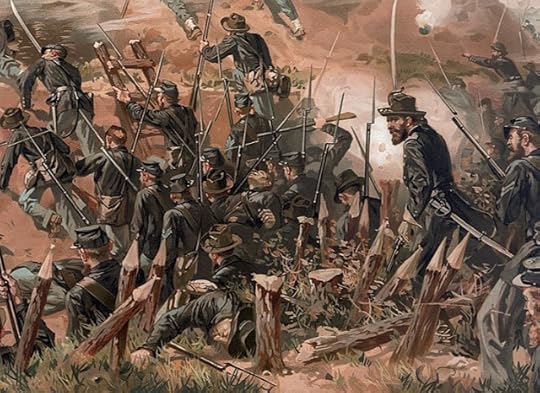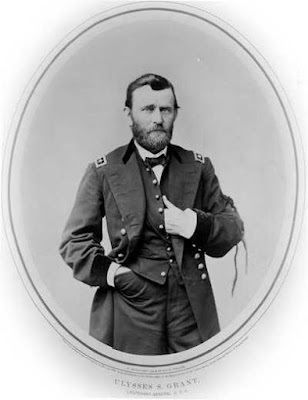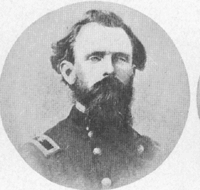Go in on your own hook, boys: With the 16th Indiana at Vicksburg
As the Federal army tightened the noose around Vicksburg onMay 21, 1863, Captain James R.S. Cox of the 16th Indiana had anopportunity to observe General Ulysses S. Grant up close and personal.
Cox was atop aridge with Generals Stephen Burbridge and A.J. Smith when he saw “GeneralGrant, smoking as usual, walking slowly along the ridge, paying no attention tothe sharpshooters who are feeling for him,” he wrote. “Some newspapers deem himincompetent to fill the position, but the soldiers of his army swear by him.They know that the campaign, thus far and under great difficulties, has beenconducted successfully. I had formed an idea from the description that he was awhiskey barrel on legs but found myself greatly in error. Paying littleattention to dress, he usually wears a stand-up collar with cap and coat muchthe worse for wear. He seems a plain unassuming man, whether studying his maps oras is his custom, smoking, walking up and down with his hands behind him, graveand thoughtful, becoming one filling his high position.”
Captain Cox’sin-depth description of the skirmishing on May 21st at Vicksburgfirst saw publication in the June 12, 1863, edition of the Dearborn CountyDemocratic Register published in Lawrenceburg, Indiana.
 As the 16th Indiana's skirmish line approached the Confederate works at Vicksburg on May 21, 1863, the Hoosiers traded barbs and bullets with the gray-clad defenders, their favorite phrase being "Here's your mule!" The Hoosiers came away impressed with the Vicksburg defenses and Colonel Thomas J. Lucas was convinced a frontal assault would be a "useless sacrifice." The following day's assault would bear out Lucas's prediction.
As the 16th Indiana's skirmish line approached the Confederate works at Vicksburg on May 21, 1863, the Hoosiers traded barbs and bullets with the gray-clad defenders, their favorite phrase being "Here's your mule!" The Hoosiers came away impressed with the Vicksburg defenses and Colonel Thomas J. Lucas was convinced a frontal assault would be a "useless sacrifice." The following day's assault would bear out Lucas's prediction. Headquarters, 10th Division, 13th Corps
(near Vicksburg, Mississippi, May 1863)
On Monday [May 18, 1863], theadvance of Grant’s army passing over Black River and driving in rear guards andskirmishers bivouacked within cannon range of the vaunted Sevastopol of the NewWorld. After its long mud impediment, like one of the Southern alligatorssuddenly awakened from its torpor, this army had marched nearly 200 miles,passing completely in rear of the foe. In 20 days, it had fought and gained 8battles, captured 72 pieces of artillery, the capitol of the state, 10,000prisoners, and so many small arms that for want of transportation, thousands ofthem were burnt.
Division after division arrivedduring the night and took up their position so when the sun rose on Wednesday morning[May 20] it found the Rebel forces completely encircled: Sherman’s army corpson the right, McPherson in the center, McClernand on the left with McArthur andhis men in possession of Warrenton on the Mississippi. The enthusiasm commonwith recruits had long since passed away from the men which compose this army.Here were regiments who spoke with pride of battlefields as far back as Belmontwhile many bore inscribed upon their banners the proud word Shiloh.
The Rebels had spent a year inpreparing to meet the shock and now the gathering forces of the Federal armyseemed locked round the doomed city in a death struggle for supremacy of theSouthwest. Every state in the Northwest is represented here, and they seem toknow that before them are strong works with desperate men to man them. A spiritof grim earnestness is seen on every countenance from the general in his tentto the skirmisher watching his chance for a shot over the walls of the fort.
 General Stephen G. Burbridge
General Stephen G. BurbridgeIn the morning, the roar ofcannons unceremoniously awoke us and after breakfast, we started out to see aday’s work, General [A.J.] Smith permitting me to accompany him while the companyremained behind has headquarters guards. Passing a short distance up a ravine,horses were hitched, it being unhealthy for them on the top of the ridge. Uponreaching it, we found our gallant Brigadier General Stephen G. Burbridge at work with the 17th Ohio Battery. He said hehad been at work since daylight and had dismounted some of the enemy’s cannons.Burbridge is a noted artillerist. At Champion Hill, he fired the shot thatkilled General Lloyd Tilghman. The Rebel general had just sighted a gun andstepped back when a piece of exploding shell hit him on the head and made onetraitor less.
On the point, the eye takes in aportion of the Rebel works. We almost involuntarily draw a long breath as weperceive the number and strength of their forts. Each of their smaller worksare constructed open to the rear with a front and apron at the sides which areconnected with similar works by rifle pits. There are three or four of thesesmall forts and then a large one along the whole range of hills.
Burbridge sighted a gun at apoint where the wheels could be seen in the large fort in front of McPherson. Acolumn of smoke 200 feet high showed that he had exploded a caisson or limber.It created quite a confusion and we could see them trying to take away theartillery horses through a glass. We watched one fellow tugging away at thehalter of an obstinate mule until shells commenced dropping too thick, then hebroke. The bullets of their sharpshooters were singing over us as we lay in theshade on the green hillside, and our thoughts of May parties at home were disturbedby some of them coming unpleasantly near.
Some of the boys of the 6thMissouri Cavalry came out to see the fun. That regiment has a great reputation.They have been driven from their homes by guerillas, had their homes burned,friends murdered, wives and little ones exposed to inclement weather. Feelingthemselves to be the avengers of blood, seldom troubling themselves with prisoners,they show no mercy and feel no remorse. In trying to rally a wavering line atthe Arkansas Post fight, Major [Samuel] Montgomery, in plain view on horseback,shook his fist at the yelling scoundrels in the fort in his excess of wrath.
 "He seems a plain, unassuming man, whether studying his maps or as is his custom smoking, walking up and down with his hands behind him, grave and thoughtful," wrote Captain James R.S. Cox of his army commander at Vicksburg. "History will decide whether as the servant of a nation and the leader of great armies he possessed the requisite abilities which constitute a great general."
"He seems a plain, unassuming man, whether studying his maps or as is his custom smoking, walking up and down with his hands behind him, grave and thoughtful," wrote Captain James R.S. Cox of his army commander at Vicksburg. "History will decide whether as the servant of a nation and the leader of great armies he possessed the requisite abilities which constitute a great general." Attended by a single aide, herecomes General Grant, smoking as usual, walking slowly along the ridge, payingno attention to the sharpshooters who are feeling for him. Some newspapers deemhim incompetent to fill the position, but the soldiers of his army swear byhim. They know that the campaign, thus far and under great difficulties, hasbeen conducted successfully. I had formed an idea from the description that hewas a whiskey barrel on legs but found myself greatly in error. Paying littleattention to dress, he usually wears a stand-up collar with cap and coat muchthe worse for wear. He seems a plain unassuming man, whether studying his maps oras is his custom, smoking, walking up and down with his hands behind him, graveand thoughtful, becoming one filling his high position. History will decidewhether as the servant of a nation and the leader of great armies he possessedthe requisite abilities which constitute a great general. In conversation with thecommander of the 13th Army Corps, he was heard to say, “We willthrow in a few shells and then try it” to which McClernand answered, “Try it,it is then.”
At 3 o’clock, our line wasordered to advance skirmishing. The 16th Indiana was lying in aravine within 500 yards of the fort. General Burbridge told his men, as he wasnot following but leading them on, to “Go in boys on your own hook, protectyourselves as well as possible, and get up as near and do them as much harm asyou can.” The firing now became very brisk and the Rebels opened with front andenfilading fire.
General Smith sent me toMcClernand asking for support. The latter sent to [General Eugene] Carr whoordered [General William P.] Benton’s brigade to advance. As the latter movedforward, they were very much exposed to a raking fire of musket balls andgrape. Many fell, but the remainder went over the hill in gallant style. Aheavy fire was now going on around the entire works. All the time our own gunswere going and McPherson’s three or four batteries were plumping for keeps atthe large fort on our right.
A Rebel shell killed a man whilewe were at Blunt’s battery. While their enfilading fire of grape hummed aboutour ears real ugly, one cluster I shall remember as a piece bounced off myhead, leaving a headache and a hole in my cap while raising a bump not laiddown in any phrenological chart.
All this time our line was sonear their works that they could hear each other talking. The 16thwas yelling and shouting their usual by-word “here’s your mule” and swearing atthe Rebels as they fired, “Now damn you, why don’t you hoist the white flag?”Also, they asked if they did not want some crackers and what was the price ofsoap. The Rebels asked what regiment was in front of them to which our boysanswered, “The 16th Hoosiers!” At last, the line was withdrawn, itbeing intended merely to feel them. Tomorrow [May 22], the grand assault was tobe made.
 Colonel Thomas J. Lucas, 16th Indiana Volunteer Infantry
Colonel Thomas J. Lucas, 16th Indiana Volunteer Infantry Our regiment had suffered some.Orderly [Lewis W.] Jamison of Co. B was killed, Captain [James M.] Hildrethshot in the foot, while Colonel Thomas Lucas had a bullet through the pants andboot. But one opinion was expressed by everybody and that was that the forts inour front could not be taken by storm. The privates said we were so near thatwe could look in that ditch, but we cannot cross it to get at the works.Colonel Lucas, giving his opinion, said it would be a useless sacrifice.
I need not tell what is left ofthe 16th Indiana to charge; start them skirmishing and if they canget over, they will go, but if we are ordered, there is no discretion. GeneralSmith said to Burbridge there is no discretion left us, the order is plain, towhich the answer was “Well, we can try, but I would like to see more artilleryused to batter down their walls.” Our pickets were posted in the yard where theRebels had burnt a dwelling within 400 yards of their fort.
The moonlightplainly revealed the lines of the Rebel works and as it streamed through, thetrees showed in contrast the beautiful shrubbery and flowers, blackened chimneys,and the cannons planted in the road. The mortar boats afforded a splendid sightas they kept up their slow and ceaseless firing. There would be a broad flashof light, and the burning fuse of the ascending shell looked like a star as itseemed mounting, by sudden bounds, higher and higher. Just as it would commencedescending in the curve of a parabola, the sound of its discharge from themortar would reach the ear. As it nears the ground, the star is lost in thedazzling flash of the bursting shell, followed by the noise of its rush throughthe air and its explosion which may be heard over a circle of 20 miles.
To read more about the siege of Vicksburg, check out these posts:
A Whistling Hail of Death: The First Assault on Vicksburg with the 95th Illinois
The Ground was Slippery with Blood: The 54th Ohio Tries for Vicksburg
A Most Bloody and Foolhardy Charge: A Buckeye Recalls the First Crack at Vicksburg
Talking Smack with the Johnnies at Vicksburg
Working for Vicksburg: A Voice from the 33rd Illinois
Exhausting Pemberton's Peas: The Siege of Vicksburg
Spades are Trumps: The 96th Ohio and the Siege of Vicksburg
Source:
Letter from Captain James R.S. Cox, Co. F, 16thIndiana Volunteer Infantry, Dearborn County Democratic Register (Indiana), June12, 1863, pg. 2
Daniel A. Masters's Blog
- Daniel A. Masters's profile
- 1 follower



